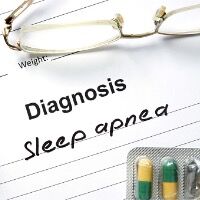
Sleep Apnea is one of the most spread sleep disorders in the UK. According to the British Lung Foundation, approximately 1.5 adults in the UK have obstructive sleep apnea, with over 85% undiagnosed and untreated.
These stats are worrying, especially because sleep apnea is a potentially life-threatening condition. Ignoring it could cause far-reaching consequences.
This article will discuss sleep apnea – what it is, its symptoms, causes and treatment options.
What is Sleep Apnea?
Sleep apnea is a spread sleep disorder that affects the breathing of people who have it. People with sleep apnea may experience regular pauses in their breathing while they're asleep. Because they are asleep and rarely wake up due to these pauses, people with sleep apnea aren't aware of something wrong with their breathing. What they might notice, however, are the effects of not getting a restful sleep. They might wonder why they wake up tired and not feeling as refreshed even if they have slept the recommended nine hours.
Regular breaks in breathing for people with sleep apnea can have severe long-term side effects.
Types of Sleep Apnea
There are two types of sleep apnea:
Obstructive Sleep Apnea (OBS)
Obstructive sleep apnea (OBS) is a type of sleep apnea where the airway is blocked at the back of the throat during sleep. This obstruction causes the individual to snore. Occasionally, the individual wakes up and gasps or takes several deep breaths to clear their airways. If you sleep next to someone who has OBS, this will sound like choking or snorting.
Central Sleep Apnea (CSA)
Central Sleep Apnea is caused by a communication breach between the brain and the muscles of the throat that control the breathing mechanism. Less than one percent of people with sleep apnea present central Sleep apnea. It is very rare.
Symptoms of Sleep Apnea
The following symptoms of sleep apnea are broken down into obstructive sleep apnea and central Sleep apnea.
Symptoms of Obstructive Sleep Apnea
Restless sleep with frequent hours of wakefulness;
Sleeping too much during the day;
Dry mouth when you wake up in the morning;
Inability to focus on tasks;
Loud snoring, with snorting, gasping or choking sounds;
Persistent headache after waking;
Persistent urge to urinate at night.
Symptoms Central Sleep Apnea
Waking up at night;
Inability to focus on tasks during the day;
Abnormal breathing patterns at night that pauses, slow down, or speed up;
Shortness of breath at night;
Chest pains at night;
Persistent headaches in the morning.
Sleep apnea symptoms are challenging to the clock, especially for the person with the condition, because symptoms are apparent when they are asleep. So, it is most likely someone sleeping next to them that may notice symptoms like snoring and abnormal breathing. Nevertheless, the best way to diagnose sleep apnea is by seeing a doctor.
Causes of Sleep Apnea
The causes of sleep apnea are based on the type. Obstructive sleep apnea is caused by the muscles on the back of the throat relaxing in sleep and constricting the airway. Central sleep apnea is caused by miscommunication between the brain and the muscles controlling breathing, leading to shallow and slower breaths.
Who is At Risk For Sleep Apnea
Too many things cause sleep apnea, but some traits are at a higher risk for developing it. People who are at high risk for sleep apnea include:
People who have a specific head and neck anatomy are at higher risk for obstructive sleep apnea;
People aged 60 and above are at higher risk;
Obese or overweight people;
Men are more at risk for sleep apnea than women;
People who sleep on their backs;
People with severe heart and lung conditions;
People who take alcohol and smoke cigarettes;
Use of some drugs that affect breathing, like opioids;
People with a family anamnesis of sleep apnea;
People with hypothyroidism or increased production of growth hormones;
People with nasal congestion.
If you're at risk for sleep apnea, it is advisable to check if you already exhibit symptoms of the condition. Also, for the prevention of disease, it is recommended to meditate before going to bed using the best meditation app.
Treatment for Sleep Apnea
The treatment for sleep apnea is mostly therapy. The former is positive airway pressure (PAP) therapy. During this treatment, the patients wear a continuous positive airway pressure device that feeds them a continuous stream of air. The National Library of Medicine says that PAP therapy is mainly used to treat obstructive sleep apnea, and the device is only given out with a prescription.
Another treatment plan uses mouthpieces to hold the jaw in a good position to combat obstructive sleep apnea caused by anatomical changes.
Conclusion
If you or anyone you know exhibits symptoms similar to those outlined above, don't hesitate to contact a doctor and get a medical diagnosis.



(0) comments
We welcome your comments
Log In
Post a comment as Guest
Keep it Clean. Please avoid obscene, vulgar, lewd, racist or sexually-oriented language.
PLEASE TURN OFF YOUR CAPS LOCK.
Don't Threaten. Threats of harming another person will not be tolerated.
Be Truthful. Don't knowingly lie about anyone or anything.
Be Nice. No racism, sexism or any sort of -ism that is degrading to another person.
Be Proactive. Use the 'Report' link on each comment to let us know of abusive posts.
Share with Us. We'd love to hear eyewitness accounts, the history behind an article.